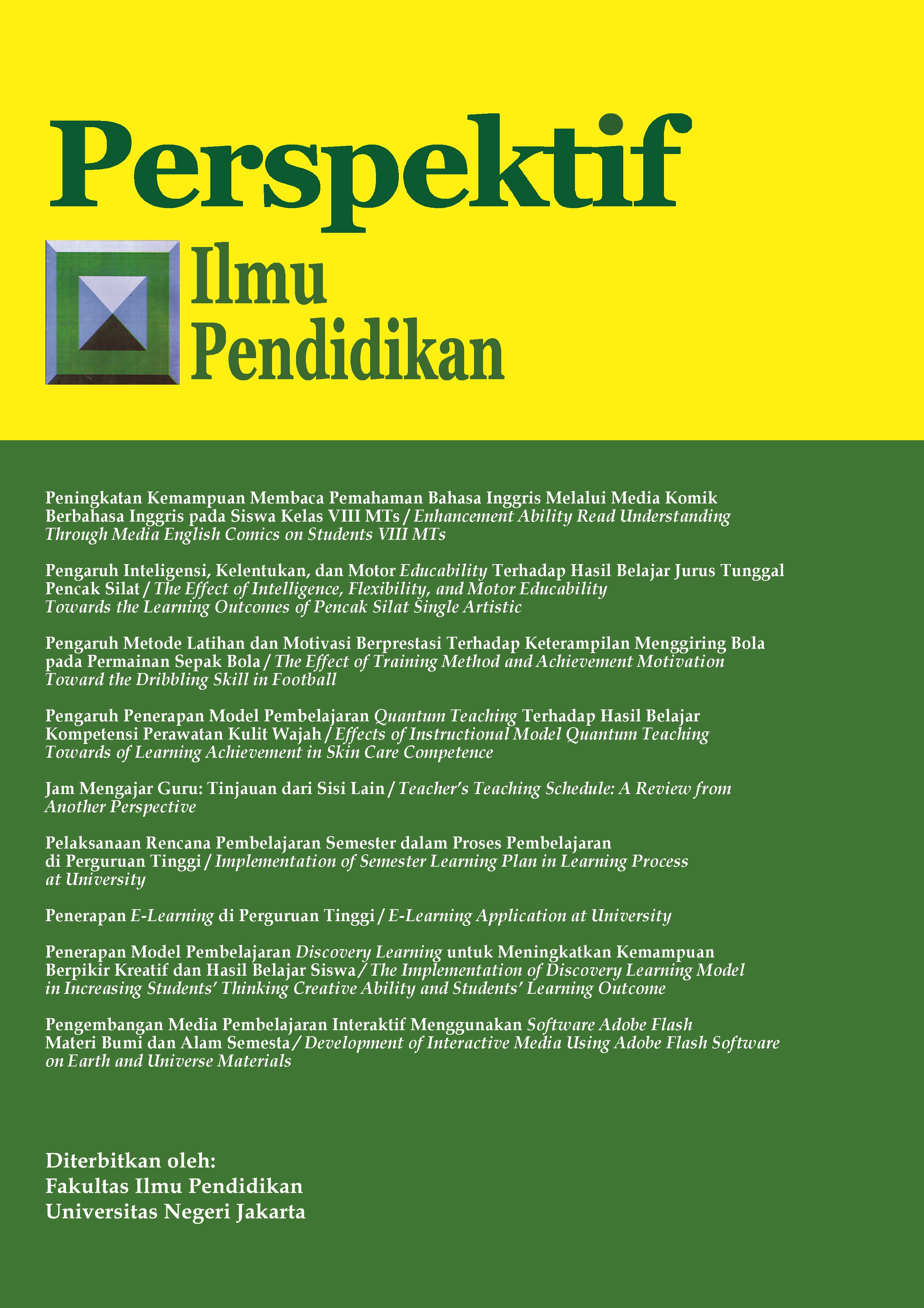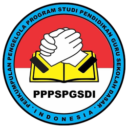PENGARUH INTELIGENSI, KELENTUKAN, DAN MOTOR EDUCABILITY TERHADAP HASIL BELAJAR JURUS TUNGGAL PENCAK SILAT
DOI:
https://doi.org/10.21009/PIP.321.2Keywords:
intelligence, flexibility, motor educability, learning outcomes in pencak silat single artisticAbstract
The background to this research is the unfavorable of the learning outcomes in pencak silat single artistic. The purpose this research was to determine the effect of intelligence, flexibility, and motor educability of the learning outcomes in pencak silat single artistic student on Unit Kegiatan Mahasiswa Pencak Silat Islamic University “45â€. This research was conducted at Islamic University “45†Bekasi, Jl. Cut Meutia No. 83 Bekasi in November 2016 with survey method, technical analysts use path analysis. The population this research is the student on Unit Kegiatan Mahasiswa Pencak Silat Islamic University “45 amount to 30 people. The sampling technique used purposive sampling amounted to 16 people. The instruments used are learning outcomes in pencak silat single artistic used assessment rubric scale of 3 (good, enough and less), an intelligence test, sit and reach test, and Motor Educability Iowa Brace Test. The conclusion is: (1) Intelligence directly affects the learning outcomes of pencak silat single artistic, (2) flexibility has no directly affects the learning outcomes of pencak silat single artistic, (3) Motor educability directly affect the the learning outcomes of pencak silat single artistic, (4) Intelligence directly affects the motor educability, and (5) flexibility directly affects the motor educability.
References
Arikunto, S. (2013). Prosedur penelitian suatu pendekatan praktik. Jakarta: PT. Rineka Cipta.
Badriah, D.L. (2009). Fisiologi olahraga edisi II. Bandung: Multazam.
Edwards, H. W. (2011). Motor learning and control: Form theory to practice. USA: Wadsworth.
Haqiyah, A., & Mulyana., et al. (2017). The effect of intelligence, leg muscle strength, and balance towards the learning outcomes of pencak silat with empty-handed single artistic. JETL (Journal of Education, Teaching And Learning), 2, 211-217. doi: http://dx.doi.org/10.26737/jetl.v2i2.288
Haqiyah, A. (2016). Pengaruh inteligensi, kekuatan otot tungkai, dan keseimbangan terhadap hasil belajar jurus tunggal tangan kosong pencak silat. PERSPEKTIF Ilmu Pendidikan, 30(2), 125-134. doi: https://doi.org/10.21009/PIP.302.7
Hasil MUNAS XII IPSI. (2007). Peraturan pertandingan pencak silat. Diakses melalui https://ipsibalikpapan.files.wordpress.com/2011/04/peraturanpertandinganpencaksilat.pdf
Kadir. (2015). Statistika terapan. Jakarta: Rajawali Pers.
Kuswana, W.S. (2014). Biopsikologi pembelajaran perilaku. Bandung: Alfabeta.
Lubis, J. & Wardoyo, H. (2014). Pencak silat edisi kedua. Jakarta: Rajawali Sport.
Nuraini, S. (2014). Hasil belajar jurus tunggal pencak silat tangan kosong, studi eksperimen tentang gaya mengajar, umpan balik dan motor educability pada mahasiswa Fakultas Ilmu Keolahragaan Universitas Negeri Jakarta. Disertasi. Jakarta: Universitas Negeri Jakarta.
Schmidt, R.A. (2000). Motor control and learning. United State America: Human Kinetics.
Schmidt & Wrisberg. (2000). Motor learning and performance. Champaign: Human Kinetics.
Soemanto, W. (2012). Psikologi pendidikan landasan kerja pemimpin pendidikan. Jakarta: Rineka Cipta.
Tangkudung, J. (2012). Kepelatihan olahraga. Jakarta: Cerdas Jaya.
Van der Fels, I.M.J. & C.M te Wierike, S., et al. (2015). The relationship between motor skill and cognitive skills in 4-16 years old typically developing children: A systematic review Elsevier. Journal of science and medicine in sport, 18(6), 697–703. doi: https://doi.org/10.1016/j.jsams.2014.09.007
Widiastuti. (2015). Tes dan pengukuran olahraga. Jakarta: Rajawali Pers.
Zubaidi, A. (2009). Tes inteligensi. Jakarta: Mitra Wacana Media.
Downloads
Published
How to Cite
Issue
Section
License
Authors who publish with this Journal agree to the following terms:
- Author retain copyright and grant the journal right of first publication with the work simultaneously licensed under a creative commons attribution licensethat allow others to share the work within an acknowledgement of the work’s authorship and initial publication of this journal.
- Authors are able to enter into separate, additional contractual arrangementfor the non-exclusive distribution of the journal’s published version of the work (e.g. acknowledgement of its initial publication in this journal).
- Authors are permitted and encouraged to post their work online(e.g. in institutional repositories or on their websites) prior to and during the submission process, as it can lead to productive exchanges, as well as earlier and greater citation of published works.
-
Users/public use of this website will be licensed to CC BY-NC-SA Creative Commons Attribution-NonCommercial-ShareAlike 4.0 International License












